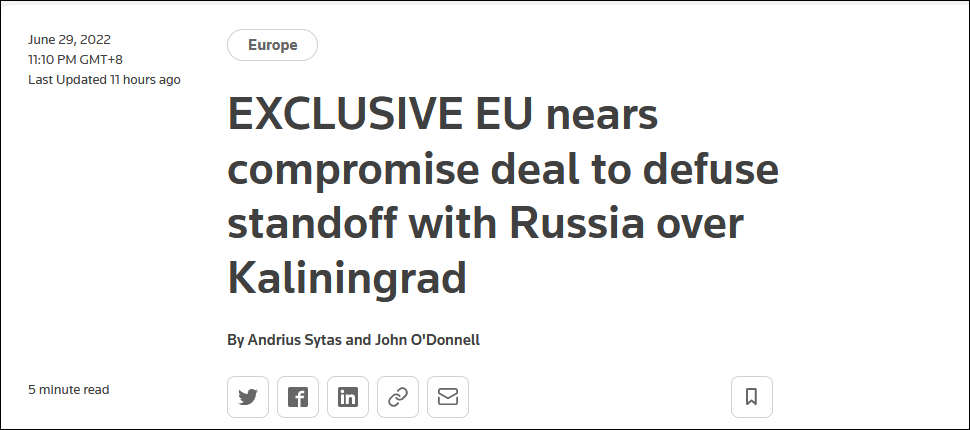Reuters quoted two sources as saying on June 29 that the dispute between Lithuania and Russia over transit transportation in Kaliningrad Oblast is expected to be resolved in the next few days. With Germany's support, EU officials expect a deal with Lithuania to resolve its problems with Russia, because it will be difficult for the EU to avoid escalating its conflict with Russia or even militarily wrangling while insisting on tough sanctions.

Reuters: The EU is close to reaching a compromise agreement to resolve the stalemate with Russia on Kaliningrad
According to the above-mentioned sources, EU officials are discussing the issue of exempting Russian goods from sanctions for transit through Lithuania to Kaliningrad, because Kaliningrad Oblast belongs to Russia, a situation different from normal international trade. Humanitarianism is also a consideration.
However, the sources pointed out that concessions to Russia are also conditional, that is, the goods approved for transport can only be used in Kaliningrad and cannot be transshipped to other places through the ports of the Baltic Fleet. But the source acknowledged that it would be difficult to guarantee that Russia would comply with the rule, which could also lead to conflict between Lithuania, which is responsible for confirming the final destination of the goods, with Russia.
For now, Lithuania remains reserved for concessions to Russia. If Lithuania can abandon its reservations on the issue, the parties are expected to reach an agreement in early July, the sources said. One of the sources said the parties expected to reach a compromise agreement by July 10, and another said the agreement could be announced next week.
The dispute over the isolation of Russian enclaves is testing Europe's determination to impose sanctions on Russia. While Western powers have pledged to support Ukraine and reiterated their resolve at this week's Group of Seven (G7) and NATO summits, it has proven difficult for Europe to avoid further escalation of the conflict with Russia while insisting on tough sanctions against Russia.
One of the sources said that was why, with Germany's support, EU officials were seeking compromises.
Lithuania to Kaliningrad railway line (Photo: Lithuanian media Respublika.lt)
The source also pointed out that normally Russian native goods must pass through Belarus and then Lithuania to enter Kaliningrad. If the transport route is not restored, Lithuania fears that Russia may use force to forcibly open a land route on its territory. However, with German troops stationed on Lithuanian territory, Germany could become embroiled in NATO's military confrontation with Russia.
"We have to face reality." A person with direct knowledge of the EU negotiations said Kaliningrad Oblast was "sacred" to Russia. "(Putin) has more influence than we do, and it's in our interest to find a compromise solution, although the end result may not seem fair."
A spokesman for Lithuania's foreign ministry said it would continue consultations with the European Commission on sanctions against Russia, but that any changes made by the EU should not be directed at Lithuania alone.
"Sanctions must be implemented, and no decision (eu) should compromise the effectiveness and credibility of the sanctions policy." He added, "Since [Russia] can also transport goods to Kaliningrad through other EU member states, the European Commission cannot limit its arguments on how sanctions will be imposed to Lithuania." ”
Geographical location of Kaliningrad Oblast
Russia's Kaliningrad Oblast is located on the eastern shore of the Baltic Sea, separated from mainland Russia, bordered by Poland to the south, and Lithuania to the northeast and east, with an area of only 15,100 square kilometers. Russia has long relied on Belarus and Lithuania as transit countries for goods destined for Kaliningrad.
From June 18, Lithuania began banning eu-sanctioned goods from transiting through Lithuanian territory to Kaliningrad, further exacerbating tensions with Russia. On the 20th, the Russian Foreign Ministry summoned the Lithuanian Chargé d'affaires a.i. in Russia, calling it an "open act of hostility" and issuing an "ultimatum" to Lithuania.
The tense situation between Lithuania and Russia has also raised concerns in the EU. The European Union said on the 23rd that it has "no intention of blocking" traffic between Russia and the Kaliningrad enclave, and Lithuania is blocking transit traffic in Kaliningrad in accordance with the implementation of sanctions, but also said that it will provide more guidelines on this issue to avoid causing trouble to Kaliningrad traffic.
Bloomberg quoted sources as saying on the 27th that due to the concerns of some European countries, the EU is trying to pressure Lithuania to reduce the implementation of "EU sanctions" and allow some "prohibited goods" to enter Russia's Kaliningrad through Lithuanian territory.
The Lithuanian parliament passed an amendment bill on natural gas on the 28th, allowing the transport of natural gas between Russia and the Kaliningrad enclave through lithuanian territory in the case of prohibiting the import of natural gas from Russia.
Medvedev, vice chairman of the Russian Federation Security Council, warned again on the 27th that in response to Lithuania's blockade of Kaliningrad transit transportation, the retaliatory measures taken by the Russian side will be very tough and can "cut off oxygen to the Baltic countries." He stressed that the EU did not insist on imposing restrictions, so Lithuania's move was actually "bowing to the United States, which once again proves its stupid 'Russia-phobic' attitude."
This article is an exclusive manuscript of the Observer Network and may not be reproduced without authorization.